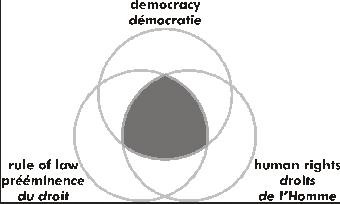A delicate question on democracy and the rule of law
- Cora Pfafferott
-
 Topic Author
Topic Author
- Offline
- New Member
-

- Posts: 11
- Thanks: 3
A delicate question on democracy and the rule of law
04 Mar 2016 23:21
Do you know how democracy and the rule of law relate to each other?
I was asking myself this question when listening to politicians and media commentators at the beginning of this year. They maintained that in view of developments in European states, such as Poland, Hungary or Switzerland, the rule of law was threatened and that they were undermining democracy.
But what exactly does "the rule of law/the constitutional state" mean, and what is the relationship between democracy and the rule of law? Is it possible to develop an abstract set of questions (not specific to any particular State but nonetheless practically applicable) on the basis of which ─depending on the answers─ it would be possible to assert that the rule of law, and thus also democracy itself, are endangered?
To find the answer I approached my colleague Dr. Klaus Hofmann. We thoroughly discussed the interdependence of democracy and the rule of law. The outcome of our deliberations is the background paper “The Rule of Law - When is it Threatened?” which you find online HERE <in pdf format>.
This work is based on the academic paper " Democracy and the Rule of Law - Two Sides of a Coin? ", published in German by Democracy International.
I hope readers on this FORUM find some time to read our document. In the end, democracy and rule of law are not abstract terms but they concern the rights of every individual citizen. When we know what these terms mean, then we can stand up to safeguard our democracies and also, we can critically assess the arguments that politicians and media commentators make.
I was asking myself this question when listening to politicians and media commentators at the beginning of this year. They maintained that in view of developments in European states, such as Poland, Hungary or Switzerland, the rule of law was threatened and that they were undermining democracy.
But what exactly does "the rule of law/the constitutional state" mean, and what is the relationship between democracy and the rule of law? Is it possible to develop an abstract set of questions (not specific to any particular State but nonetheless practically applicable) on the basis of which ─depending on the answers─ it would be possible to assert that the rule of law, and thus also democracy itself, are endangered?
To find the answer I approached my colleague Dr. Klaus Hofmann. We thoroughly discussed the interdependence of democracy and the rule of law. The outcome of our deliberations is the background paper “The Rule of Law - When is it Threatened?” which you find online HERE <in pdf format>.
This work is based on the academic paper " Democracy and the Rule of Law - Two Sides of a Coin? ", published in German by Democracy International.
I hope readers on this FORUM find some time to read our document. In the end, democracy and rule of law are not abstract terms but they concern the rights of every individual citizen. When we know what these terms mean, then we can stand up to safeguard our democracies and also, we can critically assess the arguments that politicians and media commentators make.
Reply to Cora Pfafferott
- Democracia Participativa
-

- Offline
- Administrator
-

- Posts: 125
- Thanks: 14
Re: A delicate question on democracy and the rule of law
07 Mar 2016 19:11 - 07 Mar 2016 19:13
The Participatory Democracy Cultural Initiative, Inc. (PDCI), fully supports Cora Pfafferott and the full Democracy International team in their efforts to promote the European Citizens Initiative as well as their devotion to advocate human rights and the rule of law as shown in Cora's post.
On December 10th, 2011, our PDCI drafted and approved a Proclamation titled " The Rule of Law ─ Litmus Test for Democracy " to promote the same goals from our own perspective. In our Proclamation we underlined that:
«Modern Political Science accepts democracy as the rule of the people because the “people” is not a majority but a whole, implying a consensual base as an essential requirement for the “people” to rule. Such a consensual base is what we now call the “rule of law”, meaning that government and individuals are subject to the law.».
Once we identified the premises required to lay the foundations of the rule of law, our Proclamation concludes that:
«Under the rule of law any society has the right to consider itself guided by Christian, Buddhist, Muslim or secular principles, as it wishes, as long as the fundamental rights of all members of that society (minorities as well as majorities) are fully respected. That is the litmus test for Democracy.»
On December 10th, 2011, our PDCI drafted and approved a Proclamation titled " The Rule of Law ─ Litmus Test for Democracy " to promote the same goals from our own perspective. In our Proclamation we underlined that:
«Modern Political Science accepts democracy as the rule of the people because the “people” is not a majority but a whole, implying a consensual base as an essential requirement for the “people” to rule. Such a consensual base is what we now call the “rule of law”, meaning that government and individuals are subject to the law.».
Once we identified the premises required to lay the foundations of the rule of law, our Proclamation concludes that:
«Under the rule of law any society has the right to consider itself guided by Christian, Buddhist, Muslim or secular principles, as it wishes, as long as the fundamental rights of all members of that society (minorities as well as majorities) are fully respected. That is the litmus test for Democracy.»
Last edit: 07 Mar 2016 19:13 by Democracia Participativa.
Reply to Democracia Participativa
Moderators: Miguel Saludes, Abelardo Pérez García, Oílda del Castillo, Ricardo Puerta, Antonio Llaca, Efraín Infante, Pedro S. Campos, Héctor Caraballo
Time to create page: 0.284 seconds
